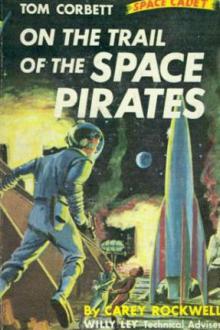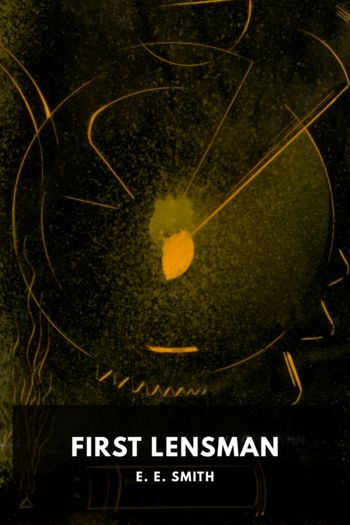Triplanetary - E. E. Smith (phonics reader TXT) 📗

- Author: E. E. Smith
Book online «Triplanetary - E. E. Smith (phonics reader TXT) 📗». Author E. E. Smith
Nero’s right thumb pressed horizontally against his chest. Every vestal was making the same sign. Pollice verso. Death. The strained and strident yelling of the mob grew even louder.
Patroclus lowered his dagger and delivered the unnecessary and unfelt thrust; and—
“Peractum est!” arose one deafening yell.
Thus the red-haired Thracian lived; and also, somewhat to his own surprise, did Livius.
“I’m glad to see you, Bronze-heart, by the white thighs of Ceres, I am!” that worthy exclaimed, when the two met, the following day. Patroclus had never seen the Bithynian so buoyant. “Pallas Athene covered you, like I asked her to. But by the red beak of Thoth and the sacred Zaimph of Tanit, it gave me the horrors when you made that throw so quick and missed it, and I went as crazy as the rest of them when you pulled the real coup. But now, curse it, I suppose that we’ll all have to be on the lookout for it—or no, unlimiteds aren’t common, thank Ninib the Smiter and his scarlet spears!”
“I hear you didn’t do so badly, yourself,” Patroclus interrupted his friend’s loquacity. “I missed your first two, but I saw you take Kalendios. He’s a high-rater—one of the best of the locals—and I was afraid he might snare you, but from the looks of you, you got only a couple of stabs. Nice work.”
“Prayer, my boy. Prayer is the stuff. I prayed to ’em in order, and hit the jackpot with Shamash. My guts curled up again, like they belong, and I knew that the portents were all in my favor. Besides, when you were walking out to meet Fermius, did you notice that redheaded Greek posturer making passes at you?”
“Huh? Don’t be a fool. I had other things to think of.”
“So I figured. So did she, probably, because after a while she came around behind with a lanista and made eyes at me. I must have the next best shape to you here, I guess. What a wench! Anyway, I felt better and better, and before she left I knew that no damn retiarius that ever waved a trident could put a net past my guard. And they couldn’t either. A couple more like that and I’ll be a Grand Champion myself. But they’re digging holes for the crosses and there’s the horn that the feast is ready. This show is going to be really good.”
They ate, hugely and with unmarred appetite, of the heaped food which Nero had provided. They returned to their assigned places to see crosses, standing as close together as they could be placed and each bearing a suffering Christian, filling the whole vast expanse of the arena.
And, if the truth must be told, those two men enjoyed thoroughly every moment of that long and sickeningly horrible afternoon. They were the hardest products of the hardest school the world has ever known: trained rigorously to deal out death mercilessly at command; to accept death unflinchingly at need. They should not and can not be judged by the higher, finer standards of a softer, gentler day.
The afternoon passed; evening approached. All the gladiators then in Rome assembled in the Claudian Grove, around tables creaking under their loads of food and wine. Women, too, were there in profusion; women for the taking and yearning to be taken; and the tide of revelry ran open, wide, and high. Although all ate and apparently drank with abandon, most of the wine was in fact wasted. And as the sky darkened, most of the gladiators, one by one, began to get rid of their female companions upon one pretext or another and to drift toward the road which separated the festivities from the cloaked and curious throng of lookers-on.
At full dark, a red glare flared into the sky from Caesar’s garden and the gladiators, deployed now along the highway, dashed across it and seemed to wrestle briefly with cloaked figures. Then armed, more-or-less-armored men ran back to the scene of their reveling. Swords, daggers, and gladii thrust, stabbed, and cut. Tables and benches ran red; ground and grass grew slippery with blood.
The conspirators turned then and rushed toward the Emperor’s brilliantly torch-lit garden. Patroclus, however, was not in the van. He had had trouble in finding a cuirass big enough for him to get into. He had been delayed further by the fact that he had had to kill three strange lanistae before he could get at his owner, the man he really wanted to slay. He was therefore some little distance behind the other gladiators when Petronius rushed up to him and seized him by the arm.
White and trembling, the noble was not now the exquisite Arbiter Elegantiae; nor the imperturbable Augustian.
“Patroclus! In the name of Bacchus, Patroclus, why do the men go there now? No signal was given—I could not get to Nero!”
“What?” the Thracian blazed. “Vulcan and his fiends! It was given—I heard it myself! What went wrong?”
“Everything.” Petronius licked his lips. “I was standing right beside him. No one else was near enough to interfere. It was—should have been—easy. But after I got my knife out I couldn’t move. It was his eyes, Patroclus—I swear it, by the white breasts of Venus! He has the evil eye—I couldn’t move a muscle, I tell you! Then, although I didn’t want to, I turned and ran!”
“How did you find me so quick?”
“I—I—I—don’t know,” the frantic Arbiter stuttered. “I ran and ran, and there you were. But what are we—you—going to do?”
Patroclus’ mind raced. He believed implicitly that Jupiter guarded him personally. He believed in the other gods and goddesses of Rome. He more than half believed in the multitudinous deities of Greece, of Egypt, and even of Babylon. The other world was real and close; the evil eye only one of the many inexplicable facts of everyday life. Nevertheless, in spite of his credulity—or perhaps in part because of it—he also believed firmly in himself; in his own powers. Wherefore he soon came





Comments (0)